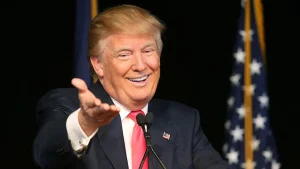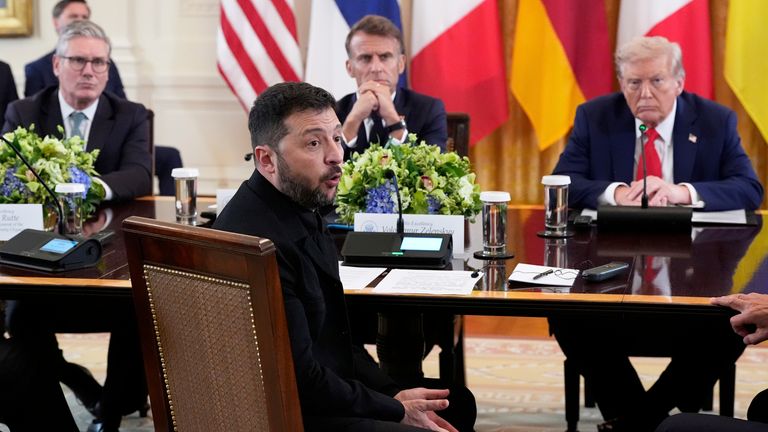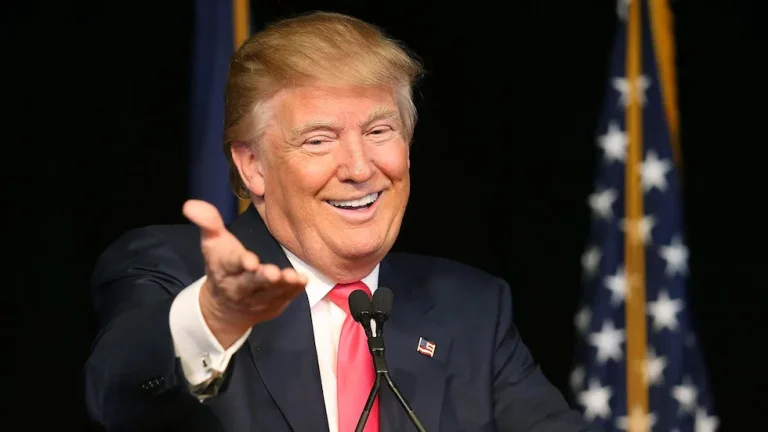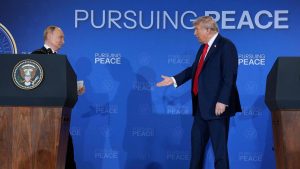During a high-level summit at the White House on Monday, President Donald Trump was overheard making a candid remark about Russian President Vladimir Putin. The moment, captured on a live microphone, quickly circulated across social media and prompted renewed debate about Trump’s relationship with his Russian counterpart.
The gathering brought together several prominent European leaders, including French President Emmanuel Macron, British Prime Minister Sir Keir Starmer, Ukrainian President Volodymyr Zelenskyy, Italian Prime Minister Giorgia Meloni, German Chancellor Friedrich Merz, Finnish President Alexander Stubb, European Commission President Ursula von der Leyen, and NATO Secretary General Mark Rutte. The discussions were intended to brief allies on Trump’s weekend meeting with Putin in Anchorage, Alaska—their first in-person encounter since 2019.
The Alaska talks had focused largely on the war in Ukraine. While both leaders confirmed afterward that no formal agreement had been reached, Trump suggested there was progress, telling reporters there was “a very good chance” that negotiations could move toward a resolution. “We spoke very sincerely,” Trump said. “I think he wants to see it done.” Putin, for his part, described the exchange as constructive and praised Trump for his “friendly” approach and his recognition of Russia’s national interests.
Against this backdrop, Trump’s private exchange with Macron drew particular attention. While leaning toward the French president during the White House meeting, Trump whispered that Putin “wants to make a deal for me.” The comment, picked up by microphones in the East Room, was broadcast publicly and quickly went viral. Trump appeared not to realize his remarks were being recorded when he added, “Do you understand? As crazy as it sounds.”
The remark immediately sparked reactions both in Washington and abroad. Critics seized on the phrasing, interpreting it as a sign that Trump viewed Putin’s willingness to negotiate as uniquely tied to him personally rather than to broader diplomatic efforts. Supporters, however, framed the comment as evidence of Trump’s ability to leverage personal rapport in order to achieve outcomes on the world stage.
Pressed later during a press conference, Trump did not shy away from the sentiment. “I’ve known him for a long time, I’ve always had a great relationship with him,” he said of Putin. “I think President Putin wants to find an answer, too. We’ll see.”
When asked about the incident, Macron sought to frame the moment in broader diplomatic terms. Speaking to NBC News, the French president said: “At the end of the day, if we have a deal which is compliant with a long-standing and robust peace, this is great news. And your president indeed is very confident about the capacity he has to get the deal done, which is good news for all of us.” Macron’s measured response suggested a willingness to place emphasis on the substance of potential peace talks rather than on Trump’s choice of words.
Observers also examined the initial Alaska meeting for clues about the tone of the Trump-Putin dynamic. Body language experts and lip readers provided their interpretations to various outlets, noting that the two leaders appeared cordial from the outset. According to one analysis, Trump greeted Putin with the word “Finally,” reflecting perhaps the length of time since their last in-person conversation. Putin reportedly replied, “I am here to help you,” to which Trump responded, “I’ll help you.” The exchange was said to conclude with Putin commenting that peace could be achieved if “they only need to ask,” and Trump replying, “I hope it does.”
https://twitter.com/ShanghaiEye/status/1957703257796571518
These details, combined with the hot mic moment, have fueled speculation about how the relationship between Washington and Moscow could evolve under Trump’s leadership. While the White House has maintained that no breakthrough was achieved in Alaska, the president’s remarks have left many wondering whether a more substantive agreement might be possible in the near future.
The incident also underscores the broader challenges facing international diplomacy in an era when unscripted comments can reverberate globally in seconds. Leaders are acutely aware that their words, whether intentional or not, are scrutinized for meaning and implications. In this case, Trump’s candid whisper reinforced his reputation for unconventional diplomacy—one rooted less in protocol and more in personal connection.
For allies, the key question is whether this style can translate into durable outcomes. Ukraine’s Zelenskyy, facing ongoing conflict at home, has repeatedly emphasized the importance of unity among Western leaders. For European heads of state like Starmer, Meloni, and Merz, the focus remains on ensuring any resolution protects both sovereignty and stability across the region. Meanwhile, NATO’s leadership continues to stress collective defense and deterrence.
As the world waits to see whether Trump’s confidence in Putin’s willingness to “make a deal” proves accurate, the hot mic moment serves as a reminder of how quickly a private aside can shift public perception. Whether it ultimately strengthens Trump’s position as a negotiator or raises new doubts about his approach, it has undoubtedly ensured that his words—and his relationship with Putin—remain at the center of international attention.

James Jenkins is a celebrated Pulitzer Prize-winning author whose work has reshaped the way readers think about social justice and human rights in America. Raised in Atlanta, Georgia, James grew up in a community that instilled in him both resilience and a strong sense of responsibility toward others. After studying political science and creative writing at Howard University, he worked as a journalist covering civil rights issues before dedicating himself fully to fiction. His novels are known for their sharp, empathetic portraits of marginalized communities and for weaving personal stories with broader political realities. Jenkins’s breakout novel, Shadows of Freedom, won national acclaim for its unflinching look at systemic inequality, while his more recent works explore themes of identity, resilience, and the fight for dignity in the face of oppression. Beyond his novels, James is an active public speaker, lecturing at universities and participating in nonprofit initiatives that support literacy and community empowerment. He believes that storytelling is a way to preserve history and inspire change. When not writing, James enjoys jazz music, mentoring young writers, and traveling with his family to explore cultures and stories around the world.









